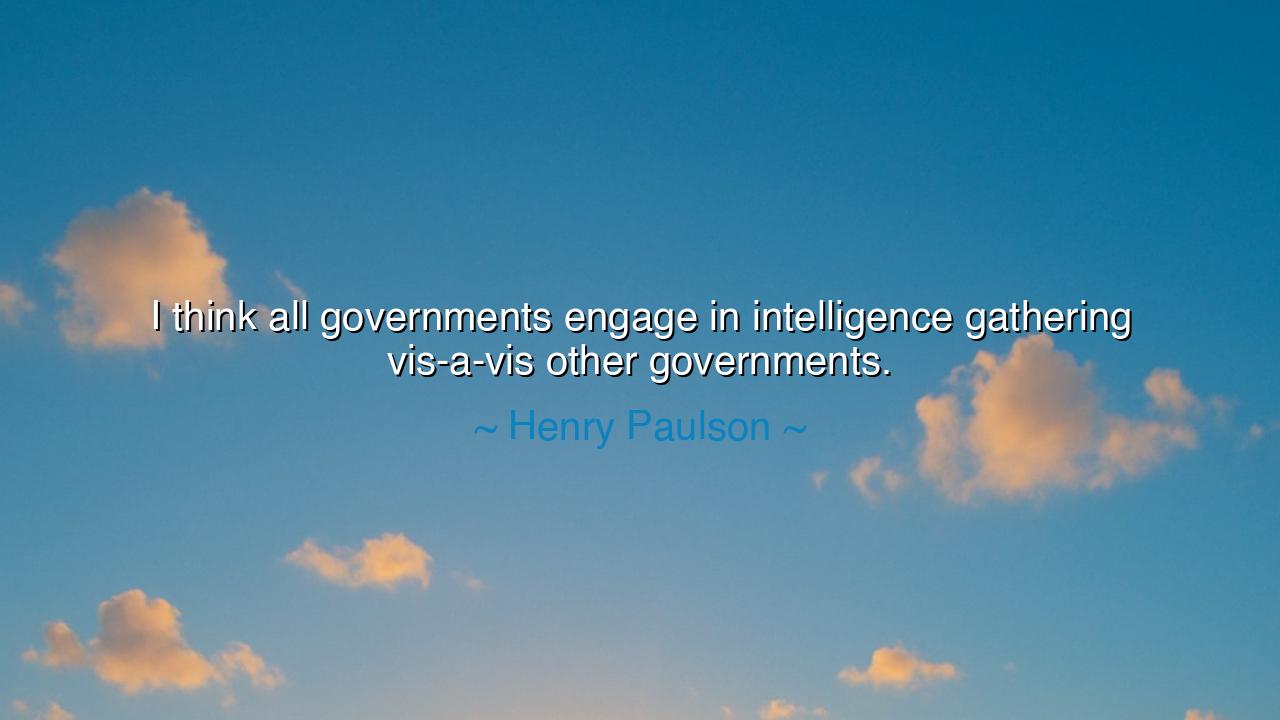
I think all governments engage in intelligence gathering






The saying “I think all governments engage in intelligence gathering vis-à-vis other governments” comes from Henry Paulson, a man who once stood at the crossroads of finance and diplomacy, peering into the secret currents that move nations. Though his words are plain, they carry the weight of ancient truth—the recognition that beneath the visible dance of treaties and smiles lies an invisible war of minds. For as long as men have ruled men, as long as nations have guarded their honor and their power, there has been watchfulness, observation, and secrecy.
The ancients knew this truth well. In the courts of kings, behind the silken curtains of palaces, whispers were traded as weapons sharper than any blade. Intelligence gathering is not the craft of deceit alone—it is the art of understanding. A ruler who blinds himself to the thoughts and movements of others is like a shepherd who closes his eyes to the wolf circling his flock. Thus, Paulson’s words do not accuse; they reveal the eternal necessity of knowledge in a world built on rivalry and mistrust. Every government, whether cloaked in democracy or monarchy, must see without being seen, if it wishes to endure.
Think of Sun Tzu, the great strategist of the East, who wrote in The Art of War, “If you know the enemy and know yourself, you need not fear the result of a hundred battles.” He taught that intelligence is not an act of malice but of wisdom. When a nation gathers knowledge of another, it does not merely pry—it prepares. It seeks to understand the tides before they crash, the storms before they rise. Thus, espionage, when stripped of its shadowed name, becomes a mirror of foresight, an instrument of preservation.
Yet there is danger in this craft, for knowledge is a double-edged sword. When watchfulness becomes suspicion, and suspicion turns to fear, nations build walls where bridges might have stood. History’s path is littered with the ruins of those who trusted too little. Consider the Cold War, when two great powers—America and the Soviet Union—watched one another with eyes of steel and hearts of ice. Their intelligence gathering reached into every corner of the earth, each fearful that ignorance would lead to annihilation. And though war never came, peace was haunted by the ghost of mistrust.
Still, there is wisdom even in this tale of shadows. It teaches that knowledge, rightly used, is the guardian of stability. The wise ruler, like the wise soul, gathers information not to dominate, but to discern—to understand the hearts of others, and thus to act with prudence. For ignorance is not innocence, and blindness is not virtue. A man or a nation that refuses to see will one day stumble into ruin.
To the generations who come after, let this truth be your lantern: in every sphere—be it politics, business, or the quiet dealings of the heart—understanding is strength. Learn not only what others show, but what they conceal. Listen not only to words, but to silences. Study motives as carefully as actions, and you shall walk in wisdom’s light while others grope in the dark.
But take heed, for intelligence without honor is corruption, and knowledge without compassion is tyranny. Gather what you must, but wield it as a healer, not a destroyer. Let your understanding serve justice, not domination. For the greatest intelligence is not that which uncovers the secrets of others, but that which governs one’s own heart with clarity and truth.
So when you reflect upon Henry Paulson’s words, hear not the voice of cynicism, but the echo of ancient prudence. To know is to protect; to understand is to lead. The wise man gathers knowledge as a gardener gathers seeds—patiently, quietly, and with the hope that they may one day bear the fruit of peace. Be watchful, but be just. Be discerning, but be kind. For in the harmony between awareness and virtue lies the strength of nations—and the salvation of souls.






AAdministratorAdministrator
Welcome, honored guests. Please leave a comment, we will respond soon